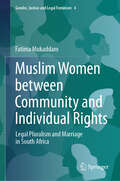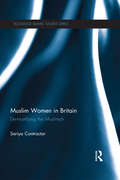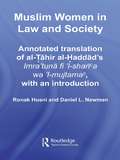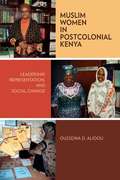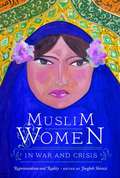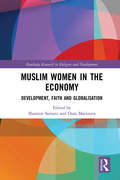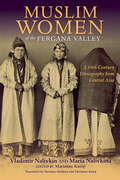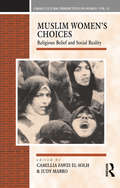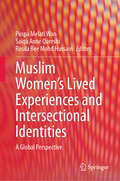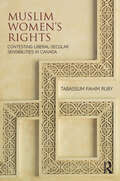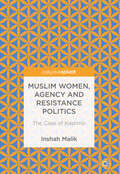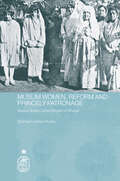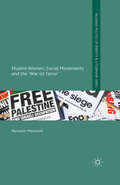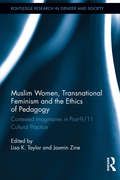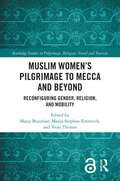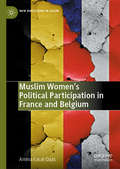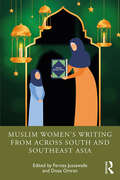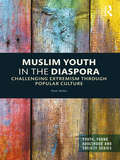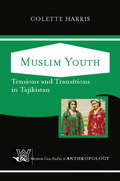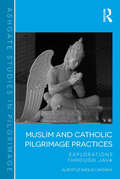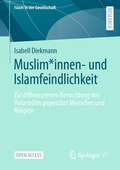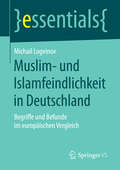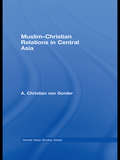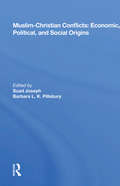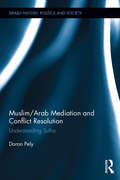- Table View
- List View
Muslim Women between Community and Individual Rights: Legal Pluralism and Marriage in South Africa (Gender, Justice and Legal Feminism #4)
by Fatima MukaddamThis book presents an in-depth exploration of the intricate negotiations of married Muslim women within Cape Town’s Muslim communities, navigating the complexities of legal pluralism governed by Muslim Personal Law (MPL). Spanning historical epochs from colonialism to the democratic era, it argues that MPL’s informal status perpetuates patriarchal norms, especially in the domain of marriage. It critically examines the consequences of the non-recognition of Muslim marriages within the civil legal framework and underscores the ambiguous intersections of MPL with broader legal systems, which leaves women in a precarious legal state overshadowed by religious doctrines.Adopting a gender perspective and an interdisciplinary approach that combines political science, sociology, and the law, the book reveals the historical roots of legal pluralism, while also shedding light on the political strategies that have perpetuated gender-stratified citizenship. Despite all the democratic promises, legal pluralism persists, contributing to gender disparities, and the book critically examines the government’s reluctance to address the marginalisation of Muslim women, especially through the lens of the proposed Muslim Marriages Bill (MMB).This book is essential reading for scholars in the fields of law, sociology, and gender studies, offering critical insights into the intersections of legal systems, religion, and gender dynamics within Muslim communities in Cape Town.
Muslim Women in Britain: De-Mystifying the Muslimah (Routledge Islamic Studies Series)
by Sariya Cheruvallil-ContractorPerceptions of Muslim women in Western society have been shaped by historical and sociological conditions such as colonialism, patriarchy and Orientalism. In Muslim Women in Britain, Sariya Contractor seeks to reinstate the Muslimah as a storyteller who tells her own story. An exploration of the lives of British Muslim women, this book examines issues of femininity, Britishness, inter-communal relations and social cohesion. Presenting the reader with incisive narratives of Muslim women on familiar topics such as the hijab, Muslim women in the media and feminist debate, particularly in a Western context, Sariya Contractor makes a valuable contribution to the existing literature on Islamic studies, social anthropology, feminist philosophy and social cohesion. Presenting a complex and nuanced retelling of Muslim women’s realities as explored through their own voices, stories and experiences; this book will be of interest to scholars and students of Islamic studies, Women’s studies, Social Anthropology and Sociology seeking a fresh perspective on Muslim women in Britain.
Muslim Women in Law and Society: Annotated translation of al-Tahir al-Haddad’s Imra ‘tuna fi ‘l-sharia wa ‘l-mujtama, with an introduction. (Culture and Civilization in the Middle East)
by Ronak Husni Daniel L. NewmanAn extremely timely translation of a seminal text on the role of women in Muslim society by the early twentieth century thinker al Taher al-Haddad. Considered as one of the first feminist works in Arab literature, this book will be of considerable interest to scholars of an early "feminist" tract coming from a Muslim in Arab society. Awarded the 2008 "World Award of the President of the Republic of Tunisia for Islamic Studies"
Muslim Women in Postcolonial Kenya
by Ousseina D. AlidouIn education, journalism, legislative politics, social justice, health, law, and other arenas, Muslim women across Kenya are emerging as leaders in local, national, and international contexts, advancing reforms through their activism. Muslim Women in Postcolonial Kenya draws on extensive interviews with six such women, revealing how their religious and moral beliefs shape reform movements that bridge ethnic divides and foster alliances in service of creating a just, multicultural, multiethnic, and multireligious democratic citizenship. Mwalim Azara Mudira opened a school of theology for Muslim women. Nazlin Omar Rajput of The Nur magazine was a pioneer in reporting on HIV/AIDS in the Muslim community. Amina Abubakar, host of a women's radio show, has publicly addressed the sensitive subject of sexual crimes against Muslim women. Two women who are members of parliament are creating new socioeconomic and political opportunities for girls and women, within a framework that still embraces traditional values of marriage and motherhood. Examining the interplay of gender, agency, and autonomy, Ousseina D. Alidou shows how these Muslim women have effected change in the home, the school, the mosque, the media, and more--and she illuminates their determination as actors to challenge the oppressive influences of male-dominated power structures. In looking at differences as opportunities rather than obstacles, these women reflect a new sensibility among Muslim women and an effort to redefine the meaning of women's citizenship within their own community of faith and within the nation.
Muslim Women in War and Crisis
by Faegheh ShiraziRepresenting diverse cultural viewpoints, Muslim Women in War and Crisis collects an array of original essays that highlight the experiences and perspectives of Muslim women-their dreams and nightmares and their daily struggles-in times of tremendous social upheaval. Analyzing both how Muslim women have been represented and how they represent themselves, the authors draw on primary sources ranging from poetry and diaries to news reports and visual media. Topics include:- Peacebrokers in Indonesia- Exploitation in the Islamic Republic of Iran- Chechen women rebels- Fundamentalism in Afghanistan, from refugee camps to Kabul- Memoirs of Bengali Muslim women- The 7/7 London bombings, British Muslim women, and the media Also exploring such images in the United States, Spain, the former Yugoslavia, Tunisia, Algeria, Lebanon, and Iraq, this collection offers a chorus of multidimensional voices that counter Islamophobia and destructive clichés. Encompassing the symbolic national and religious identities of Muslim women, this study goes beyond those facets to examine the realities of day-to-day existence in societies that seek scapegoats and do little to defend the victims of hate crimes. Enhancing their scholarly perspectives, many of the contributors (including the editor) have lived through the strife they analyze. This project taps into their firsthand experiences of war and deadly political oppression.
Muslim Women in the Economy: Development, Faith and Globalisation (Routledge Research in Religion and Development)
by Shamim Samani Dora MarinovaThis book explores the changing role of Muslim women in the economy in the twenty-first century. Sociological developments such as secular education, female-focused policies, national and global commitments to gender equality as well as contemporary technological advances have all served to shift and redefine the domestic and public roles of Muslim women, leading in many places to increases in workplace participation and entrepreneurship. The volume investigates the contexts of these shifts and the experiences of women balancing faith and other commitments to actively engage in the economy in vastly different countries. The book looks at how family codes and the understandings of Muslim male and female roles sit alongside social and economic advances and the increases in women partaking in the economy. Within a globalised world, it also highlights the importance of the implementation of the current sustainable development priorities in the context of Muslim societies, including Sustainable Development Goal 5 that focuses on the vital role of women and their full participation in all areas of sustainable development. With cases ranging from Saudi Arabia, Iran, Bangladesh, Pakistan, Indonesia, Nigeria, Kenya through to Spain, Bulgaria and Australia, Muslim Women in the Economy will be of considerable interest to those studying, researching and interested in gender, development and religious studies.
Muslim Women of the Fergana Valley: A 19th-Century Ethnography from Central Asia
by Mariana Markova Maria Nalivkina Marianne Kamp Vladimir NalivkinMuslim Women of the Fergana Valley is the first English translation of an important 19th-century Russian text describing everyday life in Uzbek communities. Vladimir and Maria Nalivkin were Russians who settled in a "Sart" village in 1878, in a territory newly conquered by the Russian Empire. During their six years in Nanay, Maria Nalivkina learned the local language, befriended her neighbors, and wrote observations about their lives from birth to death. Together, Maria and Vladimir published this account, which met with great acclaim from Russia's Imperial Geographic Society and among Orientalists internationally. While they recognized that Islam shaped social attitudes, the Nalivkins never relied on common stereotypes about the "plight" of Muslim women. The Fergana Valley women of their ethnographic portrait emerge as lively, hard-working, clever, and able to navigate the cultural challenges of early Russian colonialism. Rich with social and cultural detail of a sort not available in other kinds of historical sources, this work offers rare insight into life in rural Central Asia and serves as an instructive example of the genre of ethnographic writing that was emerging at the time. Annotations by the translators and an editor's introduction by Marianne Kamp help contemporary readers understand the Nalivkins' work in context.
Muslim Women's Choices: Religious Belief and Social Reality (Cross-cultural Perspectives On Women Ser.)
by Camillia Fawzi El-Solh; Judy MabroThis volume counters the prevailing Western views and stereotypes of Muslim women - usually projected through male interpretations - by presenting a cross-cultural perspective of their experiences and choices in contemporary Muslim communities. The main theme running through these papers is the manner in which Muslim women consciously as well as unconsciously manipulate religious belief to negotiate their gender roles within the context of their lives.
Muslim Women's Lived Experiences and Intersectional Identities: A Global Perspective
by Puspa Melati Wan Saiqa Anne Qureshi Rosila Bee Mohd HussainThis volume takes a global perspective on intersectionality embodied by Muslim women. It addresses questions such as balancing multiple identities, lived experiences and complex realities, and the role of faith in social roles. The chapters debunk the idea of Islam or gender being monoliths. They layer faith over gender across the globe and consider migration as an important factor, thereby exploring intersectional identities that are understudied and under-evaluated. The volume overall brings to life Islamic women's lives in all their richness and differences, with discussions on social roles, positions, initiatives, and occupations across regions. It provides recommendations and suggestions for readers to understand the complex realities of Muslim women as well as serves as a guide for practitioners and policy-makers.
Muslim Women's Rights: Contesting Liberal-Secular Sensibilities in Canada (Global Gender)
by Tabassum Fahim RubyIn the post-9/11 environment, the figure of the Muslim woman is at the forefront of global politics. Her representation is often articulated within a rights discourse owing much to liberal-secular sensibilities—notions of freedom, equality, rational thinking, individualism, and modernization. Muslim Women’s Rights explores how these liberal-secular sensibilities inform, shape, and foreclose public discussion on questions of Islam and gender. The book draws on postcolonial, antiracist, and transnational feminist studies in order to analyze public and legal debates surrounding proposed shari‘ah tribunals in Canada. It examines the cultural and epistemological suppositions underlying common assumptions about Islamic laws; explores how these assumptions are informed by the Western progress narrative and women’s rights debates; and asks what forms of politics these enable and foreclose. The book assesses the influence of secularism on the ontology, epistemology, and ethics afforded to Islam in the West, and begins to trace possibilities by which Islamic family law might be productively addressed on its own terms. Muslim Women’s Rights is a significant contribution to the fields of both Islam and gender and the critical study of secularism.
Muslim Women, Agency and Resistance Politics: The Case of Kashmir
by Inshah MalikThis book investigates agency in the historical resistance movement in Kashmir by initiating a fresh conversation about Muslim Kashmiri women. It exhibits Muslim women not merely as accidental victims but conscientious agents who choose to operate within the struggles of self-determination. The experience of victimization stimulates women to take control of their lives and press for change. Despite experiencing isolating political conditions, Kashmiri women do not internalize their supposed inferiority. The author shows that women’s struggles against patriarchy are at the heart of a very complex historical resistance to the Indian rule.
Muslim Women, Reform and Princely Patronage: Nawab Sultan Jahan Begam of Bhopal (Royal Asiatic Society Books)
by Siobhan Lambert-HurleyThis is a new and engaging examination of the emergence of a Muslim women’s movement in India. The state of Bhopal, a Muslim principality in central India, was ruled by a succession of female rulers throughout the nineteenth and twentieth centuries, most notably the last Begam of Bhopal, Nawab Sultan Jahan Begam. Siobhan Lambert-Hurley puts forward the importance for early Muslim female activists to balance continuity and innovation. By operating within the framework of Islam, these women built on traditional norms in order to introduce incremental change in terms of veiling, female education, marriage, motherhood and women's political rights. For the first time, this book analyzes the role of the ‘daughters of reform', the first generation of Muslim women who contributed to the reformist discourse, particularly at the regional level. Based on numerous primary sources in Urdu, including the tracts, books, reports, letters and journal articles of Sultan Jahan Begam and the other women of Bhopal along with official records such as the reports of early organizations and institutions in the Bhopal State, the author sheds light on an important part of India’s history.
Muslim Women, Social Movements and the 'War on Terror' (Palgrave Politics of Identity and Citizenship Series)
by Narzanin MassoumiOn 15th February 2003, two million people marched in the streets of London to call on the British government not to go to war with Iraq. Though Britain did enter war, the movement did not rest in defeat. This book tells the story of what happened behind the scenes of this extraordinary mass movement, looking specifically at the political relationship between Muslim and leftist activists.Crisis narratives about Muslims assume that they are only engaged with sectarian communalist forms of identity politics or that their supposed religious and social conservatism is incompatible with progressive values. Through telling this story, Massoumi looks closely at the role of identity politics within social movements, considering what this means in practice and whether we can meaningfully speak of identity politics. Arguing that identity politics can only be understood within the context of a wider social and political structure, this book analyses the conditions through which Muslim and leftist engagement emerges within this movement, and highlights the decisive leadership of Muslim women.
Muslim Women, Transnational Feminism and the Ethics of Pedagogy: Contested Imaginaries in Post-9/11 Cultural Practice (Routledge Research in Gender and Society #42)
by Jasmin Zine Lisa K. TaylorFollowing a long historical legacy, Muslim women’s lives continue to be represented and circulate widely as a vehicle of intercultural understanding within a context of the "war on terror." Following Edward Said’s thesis that these cultural forms reflect and participate in the power plays of empire, this volume examines the popular and widespread production and reception of Muslim women’s lives and narratives in literature, poetry, cinema, television and popular culture within the politics of a post-9/11 world. This edited collection provides a timely exploration into the pedagogical and ethical possibilities opened up by transnational, feminist, and anti-colonial readings that can work against sensationalized and stereotypical representations of Muslim women. It addresses the gap in contemporary theoretical discourse amongst educators teaching literary and cultural texts by and about Muslim Women, and brings scholars from the fields of education, literary and cultural studies, and Muslim women’s studies to examine the politics and ethics of transnational anti-colonial reading practices and pedagogy. The book features interviews with Muslim women artists and cultural producers who provide engaging reflections on the transformative role of the arts as a form of critical public pedagogy.
Muslim Women’s Pilgrimage to Mecca and Beyond: Reconfiguring Gender, Religion, and Mobility (Routledge Studies in Pilgrimage, Religious Travel and Tourism)
by Manja Stephan-Emmrich Marjo Buitelaar Viola ThimmThis book investigates female Muslims pilgrimage practices and how these relate to women’s mobility, social relations, identities, and the power structures that shape women’s lives. Bringing together scholars from different disciplines and regional expertise, it offers in-depth investigation of the gendered dimensions of Muslim pilgrimage and the life-worlds of female pilgrims. With a variety of case studies, the contributors explore the experiences of female pilgrims to Mecca and other pilgrimage sites, and how these are embedded in historical and current contexts of globalisation and transnational mobility. This volume will be relevant to a broad audience of researchers across pilgrimage, gender, religious, and Islamic studies.
Muslim Women’s Political Participation in France and Belgium (New Directions in Islam)
by Amina Easat-DaasThis book outlines the principal motivations, opportunities and barriers to Muslim women’s political participation in France and francophone Belgium. Easat-Daas draws on in-depth comparative contextual analysis along with semi-structured interview material with women from France and Belgium who self-identify as Muslim and are active in a variety of modes of political participation, such European Parliamentarians, Senators, councilwomen, trade-union activists and those engaged in grass-roots political movements. This provides an alternative framing of Muslim women, removed from the tired and often exaggerated stereotypes that portray them as passive objects or sources of threat, instead highlighting their remarkable resilience and consistent determination. Through exploring the intersecting fault lines of racial, Islamophobic and gendered struggles of Muslim women in these two cases, this book also sheds new light on the role of ‘European Islam’, political opportunity structures, secularism and Muslim women’s dress.
Muslim Women’s Writing from across South and Southeast Asia
by Feroza JussawallaThis essential collection examines South and Southeast Asian Muslim women’s writing and the ways they navigate cultural, political, and controversial boundaries. Providing a global, contemporary collection of essays, this volume uses varied methods of analysis and methodology, including: • Contemporary forms of expression, such as memoir, oral accounts, romance novels, poetry, and social media; • Inclusion of both recognized and lesser-known Muslim authors; • Division by theme to shed light on geographical and transnational concerns; and • Regional focus on Afghanistan, Pakistan, India, Bangladesh, Sri Lanka, Malaysia, and Indonesia. Muslim Women’s Writing from across South and Southeast Asia will deliver crucial scholarship for all readers interested in the varied perspectives and comparisons of Southern Asian writing, enabling both students and scholars alike to become better acquainted with the burgeoning field of Muslim women's writing. This timely and challenging volume aims to give voice to the creative women who are frequently overlooked and unheard.
Muslim Youth in the Diaspora: Challenging Extremism through Popular Culture (Youth, Young Adulthood and Society)
by Pam NilanIn a world where the term Islam is ever-increasingly an inaccurate and insensitive synonym for terrorism, it is unsurprising that many Muslim youth in the West struggle for a viable sense of identity. This book takes up the hotly-debated issue of Muslim youth identity in western countries from the standpoint of popular culture. It proposes that in the context of Islamophobia and pervasive moral panic, young Muslims frame up their identity in relation to external conditions that only see ‘good’ and ‘bad’ Muslims, on both sides of the ideological fence between Islam and the West. Indeed, by attempting to break down the ‘good’ versus ‘bad’ Muslim dichotomy that largely derives from western media reports, as well as political commentary, Muslim Youth in the Diaspora: Challenging Extremism through Popular Culture will enlighten the reader. It illuminates the way in which diasporic Muslim youth engage with, and are affected by, the radical Islamist meta-narrative. It examines their popular culture and online activity, their gendered sense of self, and much more. This original book will be of interest to students and scholars interested in the fields of sociology, cultural studies and social anthropology. It offers a particular focus on Islam for research in youth studies, youth culture, political radicalisation and religious identity. It will also be relevant to the sector of youth and social work, where practitioners seek to build cultural bridges with a new generation.
Muslim Youth: Tensions and Transitions in Tajikistan
by Colette HarrisSince the breakup of the Soviet Union, the peoples of Central Asia (Tajikistan, Kazakhstan, Kyrgyzstan, Turkmenistan, and Uzbekistan) have been exposed to new, Western influences that stress individualism at the expense Central Asian traditions of family and communalism. <P><P>Young men in particular are exposed to new ideas and lifestyles as they travel in large numbers outside their native republics for the first time, even as contemporary Islam exerts itself as a potent force for cultural conservatism, especially for women. As a result, young Central Asians today confront a complex mixture of the old and the new that strains personal relations, especially within the family, between generations, and between spouses. Relying on the author's extensive fieldwork, Muslim Youth devotes separate chapters to family life, education, dating, and marriage and the family in Dushanbe, the capital of Tajikistan. Throughout the book, emblematic life stories vividly portray the hopes and concerns of Tajiks, teasing out the complexity of modernity versus tradition and individualism versus collectivism.
Muslim and Catholic Pilgrimage Practices: Explorations Through Java (Routledge Studies in Pilgrimage, Religious Travel and Tourism)
by Albertus Bagus LaksanaExploring the distinctive nature and role of local pilgrimage traditions among Muslims and Catholics, Muslim and Catholic Pilgrimage Practices draws particularly on south central Java, Indonesia. In this area, the hybrid local Muslim pilgrimage culture is shaped by traditional Islam, the Javano-Islamic sultanates, and the Javanese culture with its strong Hindu-Buddhist heritage. This region is also home to a vibrant Catholic community whose identity formation has occurred in a way that involves complex engagements with Islam as well as Javanese culture. In this respect, local pilgrimage tradition presents itself as a rich milieu in which these complex engagements have been taking place between Islam, Catholicism, and Javanese culture. Employing a comparative theological and phenomenological analysis, this book reveals the deeper religio-cultural and theological import of pilgrimage practice in the identity formation and interaction among Muslims and Catholics in south central Java. In a wider context, it also sheds light on the larger dynamics of the complex encounter between Islam, Christianity and local cultures.
Muslim*innen- und Islamfeindlichkeit: Zur differenzierten Betrachtung von Vorurteilen gegenüber Menschen und Religion (Islam in der Gesellschaft)
by Isabell DiekmannDieses Open-Access-Buch zeigt, dass feindliche Einstellungen gegenüber Muslim*innen oder als Muslim*innen markierten Menschen und gegenüber der Religion des Islams oftmals nur wenig differenziert betrachtet werden. Die mangelnde Trennschärfe zwischen Einstellungen gegenüber Menschen auf der einen und einer Religion auf der anderen Seite manifestiert sich etwa in Definitionen, in denen Islam und Muslim*innen in scheinbar untrennbarer Art und Weise zueinander konstruiert werden oder im Operationalisierungsprozess, wenn auf manifester Ebene Einstellungen gegenüber Muslim*innen erhoben werden, das Konstrukt jedoch als Islamfeindlichkeit bezeichnet wird. Diese Studie untersucht, (1) ob eine synonyme Verwendung der Begriffe gerechtfertigt ist oder ob sich empirisch nachweisen lässt, dass Islam- und Muslim*innenfeindlichkeit nicht identisch sind, (2) inwiefern Unterschiede im Ausmaß feindlicher Einstellungen gegenüber dem Islam und gegenüber Muslim*innen bestehen und (3) wie sich Deutungsrahmen der Befragten mit den Begriffen 'Islam' und 'Muslim*innen' voneinander unterscheiden. Die Zerlegung in seine Einzelteile ermöglicht es, das Phänomen in all seinen Dimensionen zu verstehen und wichtige theoretisch-konzeptionelle, methodologische und handlungspraktische Konsequenzen abzuleiten.
Muslim- und Islamfeindlichkeit in Deutschland: Begriffe und Befunde im europäischen Vergleich (essentials)
by Michail LogvinovMichail Logvinov geht in diesem essential der Frage nach, ob die in den deutschen Meinungsumfragen gemessene Islamfeindlichkeit bzw. Islamophobie eine spezifische Auspr#65533;gung hat. Er schl#65533;gt konsensf#65533;hige Begriffsbestimmungen vor, erarbeitet die Kriterien, an denen die Islam- und Muslimfeindlichkeit in Deutschland festgemacht werden k#65533;nnen, und geht auf deren historische und soziale Ursachen ein. Die Frage, was bei Islamfeindlichkeit eigentlich gemessen wird und ob es in Deutschland ein besonderes ,,Feindbild Islam" gibt, ist gerade in Zeiten der ,,Pegida" und neuen extremistischen Formationen wie den ,,Pro-Bewegungen" relevant. Setzt sich doch die (verstehende) Sozialwissenschaft zum Ziel, Aussagen #65533;ber die Qualit#65533;t sozialer Konflikte treffen und L#65533;sungsvorschl#65533;ge anbieten zu k#65533;nnen.
Muslim-Christian Relations in Central Asia (Central Asian Studies)
by Christian van GorderThis book explores issues of cultural tension that affect Muslim and Christian interaction within the Central Asian context. It looks at the ways that Christians have interacted with Central Asian Muslims in the past, and discusses what might need to be done to improve Muslim-Christian relations in the region in the present and future. Since the time that Nestorian Christian missionaries traveled eastward from Asia Minor along the Silk Road, and Islamic cultures came to the region in the 7th century, Christians and Muslims have shared a unique relationship in a fascinating cultural milieu. Under the reigns of various conquerors, Czars, Soviets and modern nationalist strong-men, the ever changing political and economic situation of these former Soviet Republics has dramatically affected the ways that Muslims and Christians have practiced their faith. Today, as Muslims and Christians work to stabilize their interactions, they face new challenges because of the activities of Protestant Christian and Islamist missionaries who are flooding into Central Asia as never before. The book corrects common misunderstandings of Central Asia as a cultural backwater, and is a valuable introduction to Muslim and Christian interactions in one of the most quickly changing regions of the globe. It will appeal to readers interested in Muslim-Christian interaction, and for researchers in the field of World Religions, Central Asian Studies and Intercultural Studies.
Muslim-christian Conflicts: Economic, Political, And Social Origins
by Suad JosephWhat does religion mean in people's daily lives? In what ways is it a component of ethnic identity? How do religious identities and structures relate to other social identities and structures and to political and economic institutions and behavior? How can Muslim-Christian relations be understood in the context of the emergence of the world capitalist system? These are some of the questions addressed by the authors of this volume. Their collective goal--growing out of a desire to understand the continuing war in Lebanon--is to study the circumstances under which religious differences become politically salient.
Muslim/Arab Mediation and Conflict Resolution: Understanding Sulha (Israeli History, Politics and Society)
by Doron PelyInter- and intra-clan conflicts in Northern Israel pit hundreds against each other in revenge cycles that take years to resolve and impact the entire community. The Sulha is a Shari’a-based traditional conflict resolution process that works independently of formal legal systems and is widely practiced to manage such conflicts in the north of Israel, as well as throughout the Muslim and Arab worlds. The Sulha process works by effecting a gradual attitudinal transformation, from a desire for revenge to a willingness to forgive, through restoration of the victim’s clan sense of honour. Muslim/Arab Mediation and Conflict Resolution examines the process of Sulha, as practiced by the Arab population of northern Israel, where it plays a central role in the maintenance of peace among Muslims, Christians, and Druze alike. It presents detailed analysis of every stage of this at times protracted process. It uses interviews with victims, perpetrators, Sulha practitioners, community leaders and lawyers, along with statistical analysis to examine how Sulha affects people’s lives, how various sectors of society impact the practice, and how it coexists with Israel’s formal legal system. Furthermore, it examines how Sulha compares to Western dispute resolution processes. This book offers the first comprehensive exploration of the entire Sulha process, and is a valuable resource for students and scholars of Middle East studies, Islamic studies and conflict resolution.
